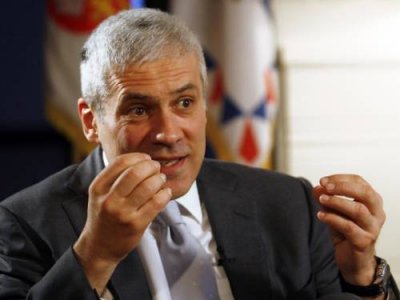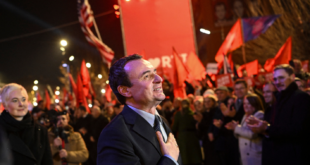 Serbia’s President Boris Tadic on Friday urged Serbs and Albanians to live in peace during a pre-Easter visit to an Orthodox monastery in the newly-independent state of Kosovo.
Serbia’s President Boris Tadic on Friday urged Serbs and Albanians to live in peace during a pre-Easter visit to an Orthodox monastery in the newly-independent state of Kosovo.
“Today I have a message of peace for Serbs, Albanians and for all people who live in Kosovo in our Serbia,” Tadic said after visiting the Decani monastery under a heavy NATO guard. “In this day there should be no hate.”
He made his visit as Kosovo submitted its case before the Hague-based International Court of Justice (ICJ) defending the legality of its secession from Serbia, which sees the region as the cradle of its religious and national identity.
This was Tadic’s second visit after the former Serbian province backed by the West declared independence last year, which its ex-master vows never to recognize.
The Kosovo government had said on Thursday they would not let Tadic visit Kosovo but later bowed to pressure from western officials in Pristina.
“This visit is private and for religious reasons. If the Serb President makes any political statement breaching the Kosovo Constitution he will be banned from entering Kosovo in the future,” Kosovo Prime Minister Hashim Thaci said in a statement.
Italian troops and carabinieri sealed off the area around the medieval church as three NATO helicopters landed nearby. About 120,000 Serbs live in Kosovo, many in enclaves spread throughout the ethnic Albanian-dominated territory.
Kosovo’s independence is recognized by 57 countries including the United States and most of the European Union members but opposed by Serbia and its ally Russia.
Serbia last year asked the ICJ to take a decision on the legality of Kosovo’s secession. Friday was the last day for Pristina and Belgrade to submit their cases but a ruling could take years, and would not be binding.
“We are hundred percent sure that decision of the Court will be in our favour,” Kosovo Foreign Minister Skender Hyseni told a news conference in the capital Pristina. He said that ICJ decision will be only “advisory and is not obligatory”.
Ten years after the conflict between Serbs and Albanians ended, the republic is patrolled by 15,000 NATO troops.
 Eurasia Press & News
Eurasia Press & News



